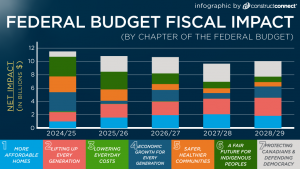Economists are struggling mightily to offer insights of value to their clients as the COVID-19 pandemic wreaks havoc on the economy, but as two members of the profession who are active in the building sector said recently, throwing their hands in the air is not an option.
Peter Norman, Toronto-based vice-president and chief economist for Altus Group, has launched a web series that analyzes the economy and the housing market and has also prepared a quarter-by-quarter forecast of the Canadian housing market.
Highlights include predictions that sales of homes will only drop by 10 per cent year over year by year’s end, with 440,000 homes sold, boosted by strong demand in the third and fourth quarters, and that starts may to return to normal by the fourth quarter and may even exceed recent highs as builders play catch-up.
All told, about 158,000 national housing starts are expected in 2020 and then over 210,000 in 2021, close to recent averages.
Both Norman and Toronto-based Alex Carrick, senior economist with ConstructConnect, parent company of the Daily Commercial News, acknowledged the difficulty of making predictions in uncertain times.
“The problem is, we are right in the middle of this so we have no idea how this is going to turn out. Nobody knows where we are. But you have to do it because you have all kinds of people clamouring for it,” said Carrick.
“Right now it is as impossible to forecast what is happening as you can possibly get.”
Norman commented, “There is a lot of uncertainty and economists don’t like uncertainty.
“I think a lot of economists feel in a quandary now. Obviously we’re in a recession that does not have economic antecedents.”
Norman developed a set of scenarios that started with the healthy housing market and fundamentals as they existed in January and February and assumed that the “deep lockdown” of the economy in March, April and early May will start to ease later in May and June.
I feel transactions will be taking place, there will be pent-up listings,
— Peter Norman
Altus Group
In July and August, employment numbers will have improved and businesses will have adapted to new rules such as distancing. At that point, he said, the natural ingenuity of the human spirit will have shifted into overdrive even as the virus continues to plague the economy for months and even a year or more.
“They are going to be ingenious and they are going to be productive and they are to get back to work as best they can,” Norman said of Canadians.
Even with immigration slowed to a trickle and perhaps four million or more Canadians subtracted from housing demand, he feels there will still be a pool of potential buyers with substantial wealth from among the 20-million-plus Canadians relatively unaffected by the pandemic.
“Once we get into that latter period, when we figure out how to run a business, I feel transactions will be taking place, there will be pent-up listings,” he said.
“We are going to see supply coming back and that pool will still be there.”
On the building side, catch-up will be slower, Norman said, because of various systemic impediments now in place including slowdowns in building approvals and shutdown of sites.
The Altus analysis of homebuilding foresees continued interruption during the months of May and June due to containment measures across the country. Then starts will begin to pick up again, though they will “still be impacted by short-term interruptions to the sales cycle, and from supply chain turbulence at least through the third quarter,” leading to a strong fourth quarter.
Data is starting to come in, Norman said, and his team has found there were fewer housing projects shut down in the GTA than feared — only about 30.
“I thought it would be more widespread,” he said.
Carrick said he has read predictions that residential construction will bounce back quickly but “I have trouble seeing how that is going to happen.” It is “wishful thinking,” he said.
The huge job losses and the stoppage of immigration, which accounts for most of Canada’s population growth of 1.5 per cent per year, are significant inhibitors of housing demand, Carrick said.
“If you have big reductions in employment, that is reductions in earnings, that is reductions in consumption, and that is not conducive to buying homes,” he remarked, noting unemployment could go as high as 20 per cent.
“There is some pent-up demand, but you have had the base of that demand cut severely in terms of job losses and population growth.”
Follow the author on Twitter @DonWall_DCN.











Recent Comments
comments for this post are closed